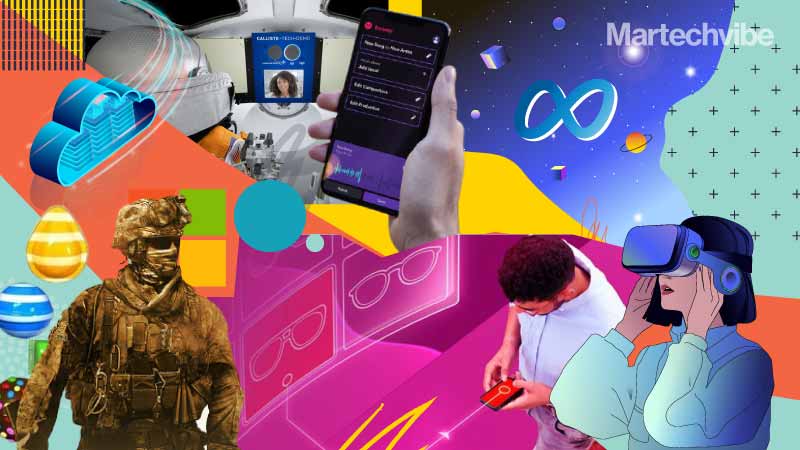January Round-Up: All The Tech News You Need To Know
2022 is off to a flying start. From metaverse and experience cloud to Amazon’s Alexa and Cisco’s Webex going to the Moon, we’ve been keeping an eye on all the top tech news and releases, many of which might shape the trends and stories that will occupy us in the days ahead. Catch up on […]
Topics
What to Read Next

2022 is off to a flying start. From metaverse and experience cloud to Amazon’s Alexa and Cisco’s Webex going to the Moon, we’ve been keeping an eye on all the top tech news and releases, many of which might shape the trends and stories that will occupy us in the days ahead. Catch up on our carefully selected news stories you may have missed, a monthly round-up we are kicking off from our newsroom
Metaverse is having a moment, and mighty tech firms are scrambling to catch up. Last week, Microsoft bought Activision Blizzard for a blistering $68.7 billion – the largest sale in the history of the video game industry – taking a strong footing in metaverse space (we know, gaming is a viable test bed).
Microsoft now owns blockbuster franchises such as Call of Duty, Diablo, Starcraft, Candy Crush and World of Warcraft. What does it mean for Microsoft? The tech giant, which has been trying to become a major player in the gaming industry for quite some time now, has the Xbox console, but has not been able to crack the interactive game software area.
With the acquisition of Activision Blizzard, these games will be available on the Xbox console, which can be tweaked and enhanced to enable players to enter the virtual world of metaverse with the help of Microsoft’s Hololens.
Also, Activision has monetised its virtual worlds, and by incorporating its knowledge Microsoft could avoid reinventing the wheel as it builds the metaverse. Most companies are still figuring out how to charge for the metaverse.
Metaverse as a phenomenon has become more pronounced ever since Mark Zuckerberg started talking about it, and rebranded Facebook to Meta. Blockbuster new-age bets have induced major FOMO among companies big and small. Graphics-chip company Nvidia is rolling out software it calls Omniverse Enterprise that offers collaboration and simulation tools on a subscription basis. Even Verizon plans to launch a virtual workspace called Spaces this year.
Now, the bandwagon has gotten bigger with Microsoft, which has been rolling out new tools for the digital world, including the wider ability for users of Microsoft’s Teams to join meetings using custom avatars (Microsoft intends to integrate Teams with its VR and AR platform Mesh this year).
——————————————————————————————————
To expedite its research in metaverse, Facebook parent company Meta unveiled a new supercomputer that the company says will be the fastest in the world, and boost research in metaverse.
The supercomputer, the AI Research SuperCluster (RSC), is the result of nearly two years of work, helped by researchers from Nvidia, Penguin Computing and Pure Storage. Meta’s research team is currently using the supercomputer to train AI models in natural-language processing and computer vision for research. The aim is to boost capabilities to day train models with more than a trillion parameters on data sets as large as an exabyte.
“The experiences we’re building for the metaverse require enormous compute power…and RSC will enable new AI models that can learn from trillions of examples, understand hundreds of languages, and more,” Meta CEO Mark Zuckerberg said in a statement provided to The Wall Street Journal.
Currently, RSC, which will increase the AI training performance by more than 2.5 times,
involves 6,080 GPUs and aims to increase the number to 16,000.
——————————————————————————————————
Amid the noise of metaverse, Sync Computing, a new deep tech startup spun out of MIT, has figured out how to avoid overspending on provisioning cloud resources for big data jobs. Complex cloud applications like AI and machine learning are eating up computing resources. With a dearth of tools to assist, the obvious solution is to throw additional computing resources at the problem and overprovision each job. This is why cloud costs are ballooning at over 20 per cent per year and are slated to surpass $330 billion in 2021.
Sync co-founders Jeff Chou and Suraj Bramhavar harnessed the computational power of physics to find the mathematically best way to provision cloud infrastructure for data, machine learning, and scientific workloads. This empowers organisations who run thousands of data jobs daily to automatically optimise low level compute resources to make running the cloud easier, faster, and cheaper.
Sync already works with enterprise customer Duolingo, the language learning app, that is using its solutions to create efficiencies in running data pipelines and cloud resources.
——————————————————————————————————
Does Amazon have its finger in too many pies? Now, Amazon Music is getting more serious about its podcast endeavours. Last year, the company acquired Art19, a major podcast hosting and monetisation platform. This month, Amazon said it’s buying exclusive advertising and distribution rights to popular true crime podcast My Favorite Murder (ranked No. 4 globally last week, according to Chartable), as well as other shows from the Exactly Right Media network as it seeks to bulk up its audio advertising business. This is a major step for Amazon as it looks to take on a bigger role in the podcasting world.
In 2020, Amazon bought podcast network Wondery for a reported $300M in a bid to compete with Spotify for podcast domination.
——————————————————————————————————
Nowadays, AI can do pretty much everything. It could even turn non-singer into a music star. Boomy, a website and app, helps its users to create their own songs using AI software. What you have to do is choose from a number of genres, click on “create song”, and the AI will compose one for you in less than a minute. After it picks the track’s key, chords and melody, you can then finesse your song. Boomy, which claims its users around the world have now created almost five million songs, even allows people to submit their tracks to be listed on Spotify and other music streaming sites, and to earn money every time they get played. Go, give Adele, Ed Sheeran, Lana Del Rey and Drake a run for their money.
——————————————————————————————————
To manage the surge and meet the needs of consumers and retailers, Microsoft and FedEx are aiming to transform commerce, supply chains and logistics combining FedEx network intelligence with Microsoft Dynamics 365 to create a cloud-based, cross-platform solution, Logistics as a Service, to improve customer engagement and enhance shipping options.
“More than ever, it’s clear just how critical having a resilient supply chain is for every organisation’s success in the modern economy,” said Microsoft Chairman and CEO Satya Nadella in a joint press release.
With the help of AI and machine learning, alongside millions of data points collected by FedEx and the computing power of Microsoft Cloud, Nadella said the two companies intend to help organisations accelerate their digital transformation by offering customers integrated shopping and shipping choices that are faster and more efficient.
——————————————————————————————————
Achieving personalisation at scale is a new imperative for retailers. Keeping that in mind, this month Adobe launched Adobe Experience Cloud offerings to enable flexible payment options, turn physical stores into pickup points, allow connections with customers via mobile, and provide seamless experiences from browse to buy.
These offerings also include a same-page enhanced personalisation capability within Adobe Target that lets retailers have offline and online interactions together and analyse them in real-time within Adobe Real-Time Customer Data Platform to create and deliver personalised experiences at scale. Retailers get a unified view of the consumer so they can provide relevant product recommendations based on recent purchases or see up-to-date rewards qualifications for discounts.
——————————————————————————————————
Marketers can now tap IBM’s Weather Company data feed at the AWS Data Exchange. IBM Watson Advertising announced the availability of data from The Weather Company on AWS Data Exchange.
IBM Watson Advertising’s Weather Analytics harnesses the relationship between weather and consumer behaviour using AI to extract deep insights to help businesses make more confident, data-driven and insightful enterprise decisions.
The weather datasets can help analyse how weather affects consumer purchasing across different categories such as pharmaceuticals, apparel and consumer packaged goods.
Local data by ZIP code including historical weather data, 15-day forecast weather data, and relative data such as hot, cold, windy and other conditions could also be used to help inform campaigns, supply chain and forecasting decisions. But the question is, will marketers know how to use it proactively to execute timely campaigns?
——————————————————————————————————
We got news on the space technology front – Amazon’s Alexa and Cisco’s Webex are going to the Moon. This month, Lockheed Martin, Amazon and Cisco have teamed up to integrate unique human-machine interface technologies into NASA’s Orion spacecraft to provide future astronauts the opportunity to learn and benefit from far-field voice technology, AI and tablet-based video collaboration. It will use Amazon Alexa and Webex by Cisco to test and demonstrate commercial technology for deep space voice, video and whiteboarding communications. The payload was designed and built by Lockheed Martin and will be integrated into NASA’s Orion spacecraft for the agency’s Artemis I uncrewed mission around the Moon and back to Earth.
——————————————————————————————————
Finally, as deep learning is maturing and becoming more widely adopted, model development and training processes are being simplified. Deci, a deep learning development company harnessing AI, released SuperGradients, an “all-in-one” deep learning training library for computer vision models.
SuperGradients enables developers to train PyTorch-based models for the most common computer vision tasks, including object detection, image classification, and semantic segmentation with just one training script. SuperGradients offers a wide range of pre-trained production-ready deep learning models that were tested in production environments. The library also includes proven training recipes for easy reproduction of training results, thus making AI more accessible for everyone.
“We decided to release SuperGradients as an open-source solution for the entire AI community to benefit from. By offering developers better tools to build, optimise and deploy models, we help to simplify the entire deep learning lifecycle and enable developers to focus on what they do best – creating innovative AI solutions to solve the world’s most complex problems,” said Yonatan Geifman, co-founder and CEO of Deci.
*We’d like to hear whether you find our monthly round-up reading helpful. Send us an email at editor@vibeprojects.com with your thoughts.
If you liked reading this, you might like our other stories
Podcast Sponsorship is Driving Purchase Intent
Make Way for A Podcast Hustle









































































































